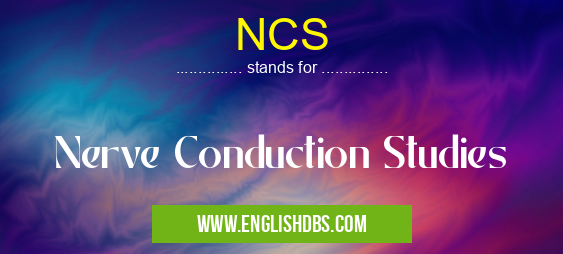What does NCS mean in NEUROLOGY
NCS is used to diagnose and monitor a wide range of neurological conditions, including:

NCS meaning in Neurology in Medical
NCS mostly used in an acronym Neurology in Category Medical that means Nerve Conduction Studies
Shorthand: NCS,
Full Form: Nerve Conduction Studies
For more information of "Nerve Conduction Studies", see the section below.
Applications of NCS
- Peripheral nerve disorders (e.g., carpal tunnel syndrome, Guillain-Barré syndrome)
- Muscle disorders (e.g., myasthenia gravis)
- Spinal cord disorders (e.g., multiple sclerosis, spinal stenosis)
- Brain disorders (e.g., stroke, brain tumors)
How are NCS Performed?
NCS are performed in a clinical setting, typically by a neurologist or neurophysiology technician. The procedure involves:
- Placing surface electrodes on the skin over the nerve and muscle to be tested
- Stimulating the nerve with a mild electrical current
- Recording the electrical response using a computer
- Measuring the conduction speed, amplitude, and latency of the response
Benefits of NCS
NCS offers several benefits, including:
- Objective evaluation: Provides objective measurements of nerve function
- Accurate diagnosis: Helps diagnose neurological conditions with precision
- Monitor treatment: Can be used to monitor the effectiveness of treatments
Essential Questions and Answers on Nerve Conduction Studies in "MEDICAL»NEUROLOGY"
What are Nerve Conduction Studies (NCS)?
NCS are a group of tests used to measure the electrical activity of nerves and the speed at which they transmit signals. They help diagnose nerve damage, muscle disorders, and other conditions affecting the nervous system.
How is NCS performed?
NCS involve placing small electrodes on the skin over the nerve being tested. A mild electrical current is then sent through the nerve, and the electrodes record the electrical activity. The results are displayed on a computer screen and analyzed by a healthcare professional.
What conditions can NCS diagnose?
NCS can help diagnose a wide range of conditions, including:
- Carpal tunnel syndrome
- Guillain-Barré syndrome
- Peripheral neuropathy
- Multiple sclerosis
- Myasthenia gravis
- Amyotrophic lateral sclerosis (ALS)
What does abnormal NCS mean?
Abnormal NCS results can indicate nerve damage or dysfunction. The specific interpretation depends on the pattern of abnormalities and the clinical symptoms present.
Are NCS painful?
NCS generally do not cause pain. You may feel a tingling or mild burning sensation when the electrical current is applied, but it should not be painful.
How long does NCS take?
NCS typically take 30-60 minutes to complete. The time may vary depending on the number of nerves being tested.
What are the risks of NCS?
NCS are generally considered a safe procedure. There is a small risk of skin irritation or allergic reaction to the electrodes.
Final Words: NCS are valuable electrodiagnostic tests that provide insights into the function of nerves and muscles. They are widely used in the diagnosis and management of neurological conditions, enabling healthcare professionals to make informed decisions about treatment and care.
NCS also stands for: |
|
| All stands for NCS |
